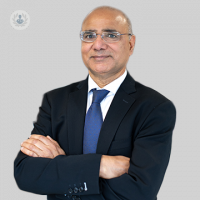What you should know about endometriosis
Written in association with:We recently spoke to esteemed and expert London and Essex-based consultant gynaecologist, Mr Mohammad Masood, in order to learn more about the female-affecting condition known as endometriosis.
Read on to find out what exactly it is, what causes it, and the main symptoms associated with the condition.

What is endometriosis?
Endometriosis is a disease where the lining of the woman’s uterus begins to grow inside the woman's body, most commonly in the pelvis. Instead of the period and blood coming out, the period blood remains inside the woman's body and blood irritates the area. Eventually, this leads to pain, scarring, and damage.
What are the main symptoms of endometriosis?
There are many symptoms of endometriosis. The main ones include the following:
- constant, unbearable pain during periods
- fatigue
- tiredness
- pain when passing urine
- pain when opening the bowels
- can lead to cysts and lumps on the ovaries
- infertility problems
The rare symptoms include endometriosis tissue, an abnormal lining which becomes present in bizarre areas, such as the diaphragm and lungs. Occasionally, I've seen women who have experienced bleeding every month from the umbilicus or caesarean section scars.
What are the known causes of the condition?
There have been several theories put forward. However, none of them are scientifically proven. The most common theory relates to retrograde menstruation, which essentially means that endometriosis blood, which normally comes away from the uterus through the vagina, also seeps through the fallopian tubes into the woman's pelvis and starts growing there. This is essentially how the condition progresses. It can sometimes cause cysts on the ovaries.
The other theories include metaplasia, where under the effect of the hormones, the cells in the pelvis turn into endometriosis or endometrium-like cells as they share the common region. There is also another theory, referred to as the lymphatic theory. This theory suggests that endometriosis cells can be carried by the lymphatics onto distant places and it can grow in these areas.
There is also a theory where it is said that woman predisposed to have endometriosis are genetically determined because some of the cells wander off at the time of development and start growing under the effect of female hormones into endometriosis.
I must emphasise that endometriosis cells, as they are similar to the lining of the uterus, feed upon the female hormones, and generally the progesterone stops them from growing. This would suggest why endometriosis tends to regress when the woman goes through menopause and also when the woman is pregnant.
Can endometriosis potentially lead to cancer?
Endometriosis is a very common disease but cancer among women with endometriosis is relatively rare. However, there are some studies which have shown that some women with endometriosis are likely to have certain forms of ovarian cancer.
Will endometriosis go away on its own without treatment?
No, endometriosis will not go away on its own, as it is a progressive disease. The woman keeps on having periods. The period blood keeps going there and it continues to grow.
In the majority of cases, it worsens over a period of time. However, in some cases, it can be put away for a few years. For example, pregnancy hormones can stop it from growing. Similarly, once we treat it, it goes away temporarily, but can grow back. That's why all treatments for endometriosis should incorporate the strategies so that it does not come back.
If you feel as though you are suffering from the symptoms outlined in the article above, make sure you book an appointment with Mr Mohammad Masood to either diagnose or rule out endometriosis. Consult with him via his Top Doctors profile today.


